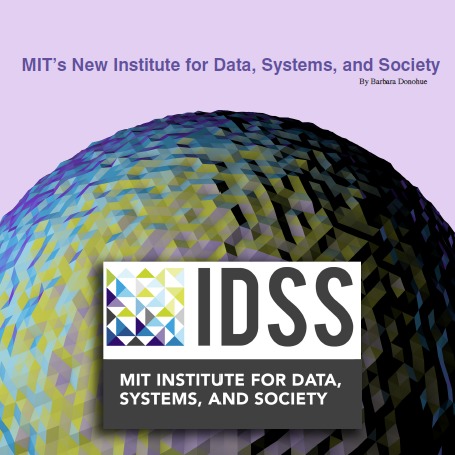

On July 1, 2015, MIT.s new Institute for Data, Systems, and Society (IDSS) was officially launched.
Created with much thought and deliberation, IDSS provides a unique focus within MIT on understanding complex systems — one that combines both technical and social sciences, drawing from every school at MIT and a multitude of disciplines. LIDS will play a central and vital role in this new institute, in everything from its leadership and shape to its education and research activities.
The mission of IDSS is to provide an education and research environment that advances analytical methods for prediction, design, and control of complex systems encompassing both technical and social systems. Within this mission, IDSS will investigate societal challenges in areas such as finance, energy, health, and transportation, utilizing analytical methods and tools from statistics, data sciences, and information and decision systems.
"In order to understand things like power outages and bank failures, you still need electrical engineers and economists — but today you also need anthropologists and data scientists," says Munther Dahleh (Director of IDSS and William A. Coolidge Professor in the Department of Electrical Engineering and Computer Science) in the MIT News article "Deans announce new Institute for Data, Systems, and Society." "Our ability to collect and aggregate data is already well beyond our ability to understand what it could tell us — and no single discipline, on its own, holds the keys to understanding and mitigating such risks."
"We used to have just mechanical and physical systems to deal with," says Alan Willsky, Edwin S. Webster Professor of Electrical Engineering and Computer Science and former director of LIDS. Now, understanding of every type of system is broadening to include human and institutional behavior. "Even power systems include markets," he says.
"If you look at complex engineering systems, whether transportation systems, communications networks, or power grids, the physical part that is engineered is clearly important, but so is its interaction with people and institutions," Munther says. For example, humans are an important factor in problems with any transportation system. People's driving habits create traffic congestion, but cities and states can influence travel behavior with tolls, incentives, and other factors. "To design efficient systems, you have to address all three components," Munther says: engineering, human behavior, and institutional behavior (or the actions of governing and regulatory agencies).
The process of developing this new institute within the Institute began in January 2014, with the formation of committees made up of about 40 faculty members. These committees worked intensively for months to develop the mission, scope, and structure of the proposed new entity, and the academic programs it would offer. In April 2014, the combined committees issued a report outlining the entity that would become IDSS.
As excited as people are about this new entity within MIT, it.s important for LIDS staff, students, and alumni/ae to know that LIDS is an integral part of IDSS, Munther says. LIDS is "part of the core and leadership of this new institute and will continue to retain its name as a research laboratory," he says. LIDS will continue to have its own space on campus, and the current director of LIDS, Asuman Ozdaglar, is an associate director of IDSS.
Alan saw the development of the new institute close up. He served as co-chair of the committee on IDSS's organizational structure. As a former director of LIDS, he was pleased with the new arrangement. IDSS addresses "major challenges deep in the areas where we have great strengths," he says. "LIDS is a wonderful environment. People love it. We worked very hard to keep that."
Part of the charge of IDSS is building a coherent effort in statistics at MIT, Munther says. The report on the formation of IDSS lists 49 courses in ten different departments that include statistics. "At MIT statistics is everywhere, so you can't find it," says Alan. "Now it will have a focal point."
IDSS faculty will include those currently working in LIDS, the former Engineering Systems Division (ESD), and the Sociotechnical Systems Research Center (SSRC) — all entities that have traditionally investigated information and decision systems, statistics, and human and institutional behavior. Each faculty member of IDSS will hold an appointment in an academic department, as well. This will help IDSS maintain its interdisciplinary nature, Munther says.
Over time, the plan is to hire 15 to 18 new faculty, Munther says. "We are given slots to hire and do so in cooperation with the departments." Faculty will be associated with all five schools of MIT: Architecture and Planning; Engineering; Humanities, Arts and Social Sciences; Science; and Sloan School of Management. The search is on to identify new IDSS faculty, Munther says, and offers have already been made to two statisticians to start in the fall.
The academic programs offered by IDSS will include a range of cross-disciplinary studies, including an undergraduate minor and a PhD in statistics and a PhD in Social and Engineering Systems.
The committee report outlined in some detail the different academic programs to be offered. For example, the new PhD in social and engineering systems will be based on the mathematical, behavioral, and empirical sciences, emphasizing data-driven analysis and modeling. It will require engineering expertise and engage quantitative social science, including field research. The program will draw students focused on specific problems, as well as students who are interested in particular methodologies.
Technological advances in areas like smart sensors, big data, communications networks, computing systems, and social networking have resulted in an increasing number of large-scale, interconnected systems that generate vast amounts of digital information. Using this information well — extracting actionable insights and developing rigorous modeling systems — presents substantial challenges across many disciplines. Alan recalls talking with another committee member, a professor of political science, when IDSS was in the planning stage. This committee member said that even political scientists have big data problems, too.
IDSS will be boundaryless, Alan says. The plan was "to be inclusive, not exclusive. It's good to engage with people in different disciplines. That's half the fun." And it's often at these intersections where real innovation happens.
